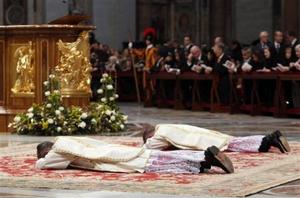 … how can we fail to recognize in all this certain essential elements of episcopal ministry? The bishop too must be a man of restless heart, not satisfied with the ordinary things of this world, but inwardly driven by his heart’s unrest to draw ever closer to God, to seek his face, to recognize him more and more, to be able to love him more and more. The bishop too must be a man of watchful heart, who recognizes the gentle language of God and understands how to distinguish truth from mere appearance. The bishop too must be filled with the courage of humility, not asking what prevailing opinion says about him, but following the criterion of God’s truth and taking his stand accordingly – “opportune – importune”. He must be able to go ahead and mark out the path. He must go ahead, in the footsteps of him who went ahead of us all because he is the true shepherd, the true star of the promise: Jesus Christ. And he must have the humility to bend down before the God who made himself so tangible and so simple that he contradicts our foolish pride in its reluctance to see God so close and so small. He must devote his life to adoration of the incarnate Son of God, which constantly points him towards the path.
… how can we fail to recognize in all this certain essential elements of episcopal ministry? The bishop too must be a man of restless heart, not satisfied with the ordinary things of this world, but inwardly driven by his heart’s unrest to draw ever closer to God, to seek his face, to recognize him more and more, to be able to love him more and more. The bishop too must be a man of watchful heart, who recognizes the gentle language of God and understands how to distinguish truth from mere appearance. The bishop too must be filled with the courage of humility, not asking what prevailing opinion says about him, but following the criterion of God’s truth and taking his stand accordingly – “opportune – importune”. He must be able to go ahead and mark out the path. He must go ahead, in the footsteps of him who went ahead of us all because he is the true shepherd, the true star of the promise: Jesus Christ. And he must have the humility to bend down before the God who made himself so tangible and so simple that he contradicts our foolish pride in its reluctance to see God so close and so small. He must devote his life to adoration of the incarnate Son of God, which constantly points him towards the path.
The liturgy of episcopal ordination interprets the essential features of this ministry in eight questions addressed to the candidates, each beginning with the word “Vultis? – Do you want?” These questions direct the will and mark out the path to be followed. Here I shall briefly cite just a few of the most important words of this presentation, where we find explicit mention of the elements we have just considered in connection with the wise men of today’s feast. The bishops’ task is praedicare Evangelium Christi, it is custodire et dirigere, it is pauperibus se misericordes praebere, it is indesinenter orare. Preaching the Gospel of Jesus Christ, going ahead and leading, guarding the sacred heritage of our faith, showing mercy and charity to the needy and the poor, thus mirroring God’s merciful love for us, and finally, praying without ceasing: these are the fundamental features of the episcopal ministry. Praying without ceasing means: never losing contact with God, letting ourselves be constantly touched by him in the depths of our hearts and, in this way, being penetrated by his light. Only someone who actually knows God can lead others to God. Only someone who leads people to God leads them along the path of life.
The restless heart of which we spoke earlier, echoing Saint Augustine, is the heart that is ultimately satisfied with nothing less than God, and in this way becomes a loving heart. Our heart is restless for God and remains so, even if every effort is made today, by means of most effective anaesthetizing methods, to deliver people from this unrest. But not only are we restless for God: God’s heart is restless for us. God is waiting for us. He is looking for us. He knows no rest either, until he finds us. God’s heart is restless, and that is why he set out on the path towards us – to Bethlehem, to Calvary, from Jerusalem to Galilee and on to the very ends of the earth. God is restless for us, he looks out for people willing to “catch” his unrest, his passion for us, people who carry within them the searching of their own hearts and at the same time open themselves to be touched by God’s search for us. Dear friends, this was the task of the Apostles: to receive God’s unrest for man and then to bring God himself to man. And this is your task as successors of the Apostles: let yourselves be touched by God’s unrest, so that God’s longing for man may be fulfilled.